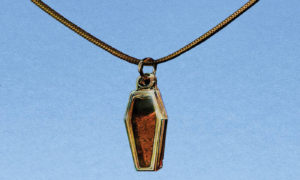Before I saw The Weather Station last month in Austin, I had been listening to the band’s newest album, Loyalty, on repeat for weeks. The Weather Station is the project of Tamara Lindeman, who creates cutting folk songs that span time and history in their simplicity and universality. I had a chance to take a portrait of Lindeman on her recent jaunt through Austin and to follow up with some email correspondence about a variety of landscapes both literal and metaphorical. Read on for her answers to my questions.
Pop Press INTL: Can you tell me a little bit about the physical geography where you were raised in rural Ontario?
Tamara Lindeman: I’m from a rocky, hilly patch of Ontario. The township is called Mulmur. It’s undulating, it’s small, it’s beautiful, and very green. My parents bought land in the 70’s and planted thousands of trees – I grew up in the resulting forest.
PPI: How do you think landscapes affect songwriting?
TL: I think anything you are sensitive to will influence your songwriting. I am very sensitive to landscape – it works on my imagination in a very deep way. But for me on this record, the landscape is more just a canvas on which to put other ideas – I tried to invert it in some ways. That iconic American landscape I talk about in Personal Eclipse is used in a backwards sense, to talk realistically about the sort of romantic projection it usually engenders, in popular music.
PPI: I hate to ask for fear that it’s such a persistent and annoying question, but how does the weather affect your songs?
TL: No one, actually, has asked me that. It does affect songs. As I say – anything you’re sensitive to will show up in songs. It’s no accident that, in pop, it’s always raining when the hero is walking away from his love…
PPI: Although you create “folk” music, your songs tend to be so free of abstraction they could be from almost any era of music. Is achieving that timelessness a concerted effort on your part?
TL: In some ways, yes. I do try to avoid signifiers that place the music in one year or another. I am a slow music listener – I tend to gravitate to a new record on a very slow timetable, and I’m often years late to something. Once I love it though, I’ll listen to it forever. So I do think about that – wanting to make something someone might listen to, or even discover, 10 years from now.
PPI: Your songs frequently give voice to female narrators. As the national conversation around women’s rights has amplified in recent years, do you think artists have a responsibility to contribute to the dialogue?
TL: Yes. It is strange to me, that this is a conversation that still needs to be had. And yet – if you look at pop music specifically, pop culture in general, it is written overwhelmingly from a masculine perspective. It presents things in a very stereotypically masculine way. It took me a long time to understand that my perspective, on love for example, which I didn’t hear represented in popular song, was also valid. I think my songs present a very grey, very complex view on things that is very feminine, in a way. We’ve come through a long era of very black and white narrative songwriting, and I feel proud to write differently.
So I don’t think about contributing to the dialogue, persay, nor do I see it as a responsibility. But I do feel a responsibility to be honest to my own perspective, in all it’s complexity.
PPI: I love Loyalty. Artists can work a lifetime and feel that they never reach the image or sound they have in their mind. Does this album feel like you artistically hit the mark?
TL: Thank you! Yes, I’m really proud of it. I’m a terrible perfectionist. But somehow, with this record, I’ve felt so calm and happy about it from the beginning. I wanted to make something beautiful and accessible and heavy, and I got to say so many things I’d been trying to say for years – it was exactly what I wanted to do. But more than anything, I just felt so lucky to have the chance to record where and how I did, and to see it released in such a thoughtful way. It’s not that I think it’s perfect or great or anything, but it’s mine, and I know it is what it was meant to be.
PPI: You just returned from being out on the road for a long time, and you have many, many dates ahead of you in the US as well as Europe. What are the most and least enjoyable aspects of such a long strings of tour dates?
TL: I really like touring. I may be singing a different tune by mid 2016, but for now, I genuinely enjoy it. I enjoy becoming close with a group of musicians, and I enjoy traveling. I love meeting humans on the road and getting to see cities I’d otherwise never see.
The least enjoyable thing is, honestly, playing music in venues that seem like the antithesis of a place where music should be played. Which is, frankly, most bars. It’s always so heartbreaking to walk into a place with broken mic stands and broken monitors, with a staff that obviously wishes you didn’t exist… it takes a lot of stamina and determination to go out there and still perform your best, when you feel like no one wants your presence or your music. To all the venues that put in that extra little bit of thought to sound and ambience … thank you.
Purchase The Weather Station’s newest effort, Loyalty, right here.











